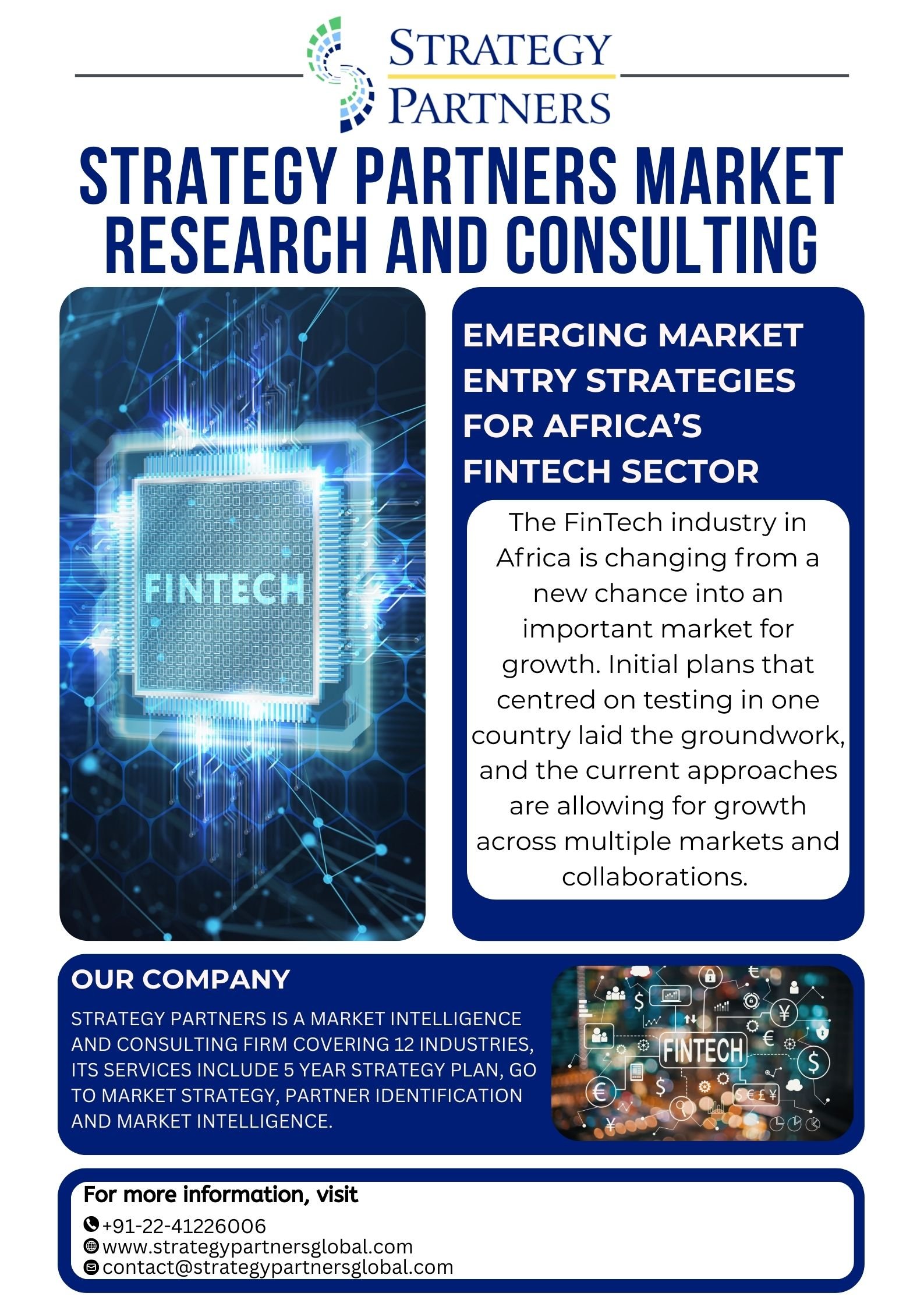Africa’s FinTech sector is moving from mobile-first beginnings to AI-driven, cross-border innovation, creating vast opportunities for scalable, inclusive financial solutions
Market Entry Strategies for Africa’s FinTech Sector
The FinTech industry in Africa has been steadily growing, becoming an important part of the global finance system. With a youthful population, increasing mobile access, and a lack of traditional banking services, Africa has a lot of potential for practical financial solutions that use technology. Over time, the offerings have expanded beyond basic mobile money to include various services such as digital banking, payment methods, loans, and insurance technology. To succeed in this field, it is crucial to understand local needs, adjust to changing regulations, and tackle infrastructure challenges. Older strategies are being replaced by new ones, and future will keep evolving as technology improves, regulations grow, and consumer demands shift. This ongoing change makes Africa’s FinTech market both difficult and rewarding for those who can mix creativity with local understanding.
Past: The Early Stages
Africa’s FinTech path started with mobile money, led by M-Pesa in Kenya in 2007. Initial plans focused on testing in a single country and aimed at people without bank accounts by collaborating with mobile service providers instead of banks. The services used USSD and SMS technology to reach those with limited internet access and few smartphones. Regulations were not very strict, which allowed for new ideas but also had risks related to compliance. Most funding came from organizations focused on development and investors interested in social impact. Even with issues like poor infrastructure, slow internet, and a need for consumer trust, these innovations replaced cash transactions with mobile transfers, bill payments, and account top-ups, creating the groundwork for Africa’s mobile-first financial inclusion model.
Present: A Diversified and Expanding Market
Africa’s FinTech sector includes digital banking, lending, money transfers, blockchain applications, and insurance technology. Entering the market usually involves launching in multiple countries at once, utilizing cloud-based, API-driven systems, and ensuring payment networks can work together. New partnerships consist of banks, regulatory bodies, and payment processors, which improves credibility and compliance. In countries like Nigeria and Kenya, regulatory frameworks and sandboxes encourage innovation while keeping consumers safe. Investments have increased significantly, especially in Nigeria, Kenya, Egypt, and South Africa. Though competition is fierce, it has led to better product quality, increased financial education, and wider inclusion, positioning Africa as one of the fastest-growing FinTech regions in the world.
Future: The Next Decade
The future of FinTech in Africa will focus on regional cooperation, solutions driven by artificial intelligence, and systems for cross-border payments. Market strategies will aim at small and medium-sized enterprises and rural areas with embedded finance, decentralized finance-based savings and loans, and platforms centred around agriculture. New digital identity technologies will simplify know your customer (KYC) processes, while governments will collaborate with FinTech companies for welfare distribution and digital taxation. Artificial intelligence will enhance credit evaluation, fraud detection, and highly personalized services. By aligning policies, advancing technology, and fostering public-private partnerships, African FinTech will become more scalable, inclusive, and able to compete on a global scale over the next ten years.
Market Entry Strategies for Africa’s FinTech Sector – Drivers
Significant Mobile Use and Digital Engagement
Africa is experiencing a rapid increase in mobile phone usage, with more than 500 million people using mobile services, which is greatly helping the growth of FinTech. The dropping prices of smartphones and better mobile coverage mean that even people in remote areas can now access online financial services. This widespread use of mobile technology has paved the way for mobile money, payment applications, and online lending services to reach communities that were previously ignored, creating a large and varied customer base.
Large Unbanked Population
Over 60% of people in Africa do not have bank accounts and cannot access regular financial services. This situation presents a major opportunity for FinTech companies to offer easy and affordable options for payments, savings, loans, and insurance. By using mobile technology and agent networks, FinTechs can help connect these individuals to financial services, improving access in both cities and rural areas.
Growing Middle Class
As cities expand and incomes rise, Africa’s consumer market is changing, with more individuals looking for quick and easy ways to handle their finances. The rising middle class is increasing the demand for digital payment options, online bank services, investment opportunities, and tools for managing wealth. This shift in demographics not only boosts the number of transactions but also opens chances for more advanced financial products.
Government Support
Many governments in Africa are actively promoting the growth of the FinTech industry by creating favorable policies, innovation centres, and regulatory frameworks known as sandboxes. These efforts aim to build a friendly atmosphere for startups, encourage cooperation between different sectors, and speed up the adoption of digital financial services. Such support can lower entry barriers and increase investor confidence in the industry.
Market Entry Strategies for Africa’s FinTech Sector – Restraints
Regulatory Fragmentation
The regulations governing FinTech in Africa are very varied, with each country having its own rules, licensing needs, and compliance procedures. This lack of uniformity makes it harder and more expensive for companies to operate across borders, often slowing down the growth of regional or continent-wide businesses.
Infrastructure Gaps
Even with progress, many areas still struggle with limited internet access, unreliable electricity, and insufficient payment infrastructure. These issues, especially in rural areas, make it difficult to provide consistent digital financial services, impacting growth and customer confidence.
Low Financial Literacy
A large part of the population does not have enough knowledge to properly understand or use digital financial products. Low awareness regarding the advantages, security measures, and functionalities can slow down acceptance and limit the effectiveness of well-designed solutions.
Market Entry Strategies for Africa’s FinTech Sector – Challenges
Cybersecurity and Fraud Risks
As more transactions occur online, the dangers associated with hacking, phishing, identity theft, and mobile money fraud also rise. Strengthening security measures and gaining users’ trust is a continuous focus for FinTech companies to protect their platforms and customer information.
Intensifying Competition
The FinTech industry in Africa is drawing in both local startups and well-known international companies, leading to increased competition. This amplifies the fight for market presence, skilled personnel, and investor interest, making it essential to stand out and grow successfully.
Funding Concentration
Investment in African FinTech is primarily focused on just a few countries—mainly Nigeria, Kenya, South Africa, and Egypt. This focus makes it hard for many potential startups in smaller or less developed markets to find the money they need to grow and innovate.
The FinTech industry in Africa is changing from a new chance into an important market for growth. Initial plans that centred on testing in one country laid the groundwork, and the current approaches are allowing for growth across multiple markets and collaborations. Future will depend on artificial intelligence, blockchain technology, and bringing regions together to achieve the next stage of inclusive financial progress


